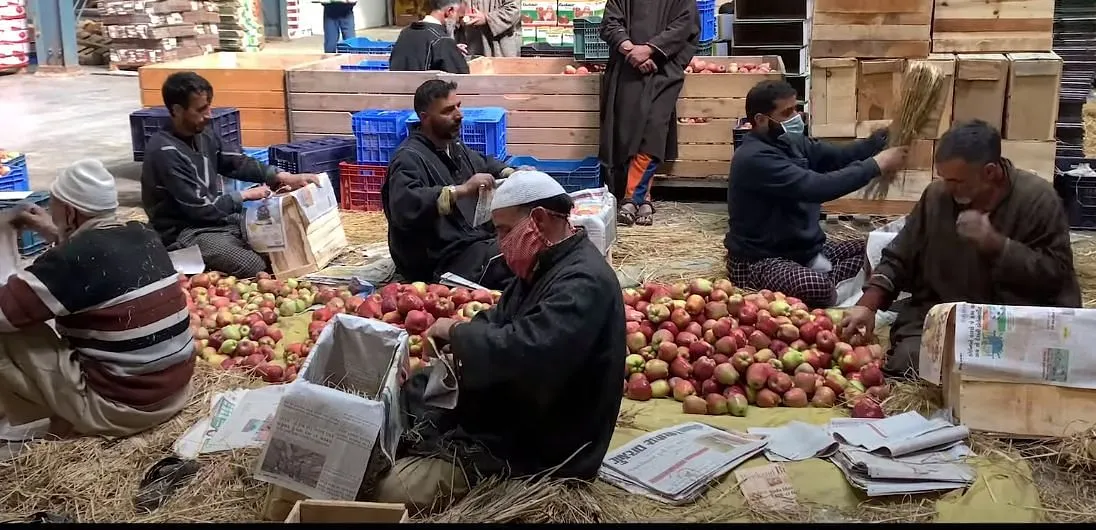Srinagar, June 25: Apple growers in Kashmir are incurring heavy losses due to “distress sale” of the fruit prompted by acute paucity of Controlled Atmosphere (CA) storage, growers and officials said.
As per available data, Kashmir produces around 20 lakh metric tonnes of apples annually. But with only 1.80 lakh metric tonnes of CA storage capacity, number of growers are compelled to sell their produce at a relatively lower price due to fear of the fruit getting perished.
Director General Horticulture Kashmir, Aijaz Ahmad Bhat told Greater Kashmir that the valley needs at least five lakh metric tonnes of controlled storage capacity to fully benefit from the local produce.
The CA storage system ensures an optimum supply of oxygen, carbon dioxide, nitrogen besides humidity and temperature to preserve edible items (apple in our case) for longer periods of time.
As per Director General Horticulture, there are 40 CA stores across Jammu and Kashmir, with Industrial Growth Centre (IGC) in Lassipora area of south Kashmir’s Pulwama alone having as many as 23 CA stores. Remaining 17 stores are in different districts, including Shopian, Srinagar, Anantnag, Baramulla and Jammu.
Bhat said that the department is ready to help entrepreneurs interested in setting up CA storages, adding the government pays them 50% subsidy.
He said that there was a need of awareness at the grassroots level to ensure that the small scale and medium scale growers too are benefited by the schemes.
That said, the non-availability of round the clock electricity in rural areas of Kashmir poses a challenge for the CA storage industry, the Director General Horticulture said. “It is not possible to come up with a CA store in every part of the region,” he quipped.
Bhat said that in order to set up a CA store, it is important that the particular area has round the clock electricity, good road connectivity and water supply. The CA store will be a failure if these things are not available, he added.
But, according to President of New Kashmir Fruit Association, Bashir Ahmad Basheer, who is also the chairman of Kashmir Valley Fruit Growers-cum-Dealers Union Kashmir — an amalgam of all the fruit traders’ and growers’ unions– the administration and the growers are not able to channelize and utilise properly even the CA stores already available in the valley.
Basheer said that small scale growers and traders are not fully aware about the utilisation of CA stores and “because the administration only considers big players in the industry during some development, the small growers are left out.”
He argued that due to lack of CA stores, the quality of fruit grown in Kashmir “has not reached its threshold yet”.
“Lack of knowledge about horticulture, negligence by successive J&K governments and apprehensions about fruits getting perished have limited farmers to grow medium quality fruit on a large scale,” Basheer said.
Acknowledging the paucity of CA storage, Basheer said that if an adequate capacity to store apples is available, traders can sell apples at a higher price at all times of the year. “For, they will not fear their fruits getting perished and can store them if not able to sell all the stock in a short period,” he explained.
Commenting on the recent pact between the J&K government and the UAE-based LuLu Group to export Kashmir apple, Basheer said that any such deal should consider taking low scale farmers onboard.
What poses all the more challenge to apple growers in Kashmir and all the more need to upscale CA storage is the switch to high density farming wherein the produce ripens earlier than normal.
As per Mohammad Ashraf, an apple grower and president of Fruit Mandi Shopian, the high density farming besides resulting in early produce of apple, will double the overall production of the fruit in the valley.
“If enough CA stores aren’t available to store those apples, it won’t only result in the perishing of fruits but the early production will result in tough competition with apples traded from Himachal Pradesh and decrease the market domination of Kashmiri apples,” Ashraf argued.
He demanded upscale in the CA stores so that high density production is preserved to be sold later in the market.
“This will not only benefit the grower but the consumer too, for he won’t need to purchase apples at a higher cost imported from other countries like US and New Zealand but can purchase local apples for a reasonable price,” Ashraf claimed.
He further said that availability of CA stores will help in keeping the Kashmiri apple in the market throughout the year, “which will help in pushing the country’s economy rather than pulling it down.”
“Switching to high density farming would be useless, if there are not enough CA stores to hold the production for greater good,” Ashraf added.
As per Assistant Professor Food Science & Technology at SKUAST-Kashmir, Dr Mushtaq Ahmad Beigh, A-grade apples in Kashmir which amount to around 8 lakh metric tonnes “are sold at less than their actual value” due to inadequate availability of CA stores in the valley.
Beigh suggested that Kashmir should have at least over 8 lakh metric tonnes of storage capacity in CA stores to cater to at least the A-grade apple production so that it can be sold in a phased manner to outside states “and for a proper price”.
“We don’t want to waste our A-grade production and as high-density farming is being implemented, we will have 60% of our production as A-grade. To benefit from our production, it is necessary that the storing capacity is increased in the valley,” Beigh, who is also an advisor to various CA owners, told Greater Kashmir.







